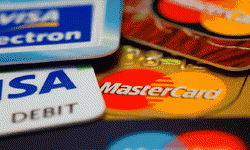ecession is over and we can all get back to normal, right? Wrong. Too many folks assume that the economic improvement we've seen of late is tantamount to an all-clear signal, but the truth is that pre-recession spending was inextricably linked to the housing bubble, and spending like it hasn't burst is actually putting us on the path to a double-dip recession.
You don't have to take my word for it, just look at the numbers. After racking up $46.7 billion in credit card debt during 2011, we're on track to add another $43.5 billion to our tab this year. Oh yeah, and all that debt you may have heard we've paid down since the downturn began? Well, we haven't actually paid down anything; credit card companies have simply written $226 billion off the books since 2008 as a result of prolonged nonpayment. As anyone who has ever defaulted on credit card debt can tell you, collectors still come looking for what's owed them, even if it's old.
In other words, we're spending as wildly as ever before and some fundamental changes are therefore in order.
Redefine "Necessity" & Implement a Budget
It's easy to become accustomed to certain creature comforts such as fancy smartphones, elaborate man caves, and robust cable packages, but do 8% of people truly need flat screen TVs, as they contend, according to a survey by the Pew Research Center? Do 4% have to have iPods? Of course not, and we have to realize that forgoing these perks is preferable to living under the pressure of debt. After all, the average interest rate for someone with even good credit is above 17%, and most of us will therefore wind up wasting hundreds of dollars on interest in paying down any balances that we incur.
Simply recognizing that we can live without certain frills is only half the battle, though. We as a society must also do a better job of budgeting. According to the National Foundation for Credit Counseling's 2012 Financial Literacy Survey, 56% of people don't have a budget and 22% don't know how much they spend on food, housing, and entertainment. It's therefore a good idea to determine how much you can afford to spend each month, rank your expenses in order of importance to figure out what needs to be cut, and then commit to not exceeding your budgeted amount.
Adopting this type of discipline certainly won't be easy, but there are a few tricks that can certainly simplify the process. First of all, you should open a new credit card specifically designated for everyday expenses. Since an inability to pay off such purchases in full indicates overleveraging, any finance charges on this account will serve as a stern wake-up call. You can also set up automatic withdrawals from a checking account and/or request that the issuer set your credit limit at your budgeted amount in order to ensure that you stay out of debt moving forward.
Pay Down Existing Balances
The Great Recession clearly illustrated how debt can complicate one's financial situation. Being just able to scrape by or continue making minimum payments can keep you afloat in good times, but if the economy takes a turn for the worse or you lose your job, the interest will keep piling up and you'll find it much harder to climb out of the hole you've dug. Credit card trends also show that 0% introductory terms have gotten about as good as they're going to get, so now is the time to attack that existing balance.
The best tool with which to do so is the Slate Card from Chase, as it offers 0% on balance transfers for 15 months and doesn't charge either an annual fee or a balance transfer fee. You can use a credit card calculator to see exactly how much you'd save with such a card, but the average household with a $6,700 balance is looking at avoiding more than $800 in interest charges and becoming debt free a couple of months sooner than otherwise.
Final Thoughts
Ultimately, escaping debt is more than a task for personal improvement; it's a civic duty. Not only does widespread overleveraging leave us personally vulnerable to disaster during tough economic times, but the collective impact can be significantly more devastating to the economy in general. Besides, would we rather continue shoveling our hard-earned money into big banks' coffers or use it to build an emergency fund and support local small businesses? The answer should be obvious by now, so let's get to work.
Odysseas Papadimitriou is the CEO of Card Hub, a leading credit card website, and Wallet Hub, a personal finance social network.





